A year of UPSKILLS in Switzerland
From June 2022 to June 2023
This blog entry is a chronicle of how we refined our learning blocks, consolidated our local community and got some ideas on how to move forward after this conclusive year of the project.
In this post:
- A summary of the Swiss multiplier events
- Our latest news
- Slides by presenters
- Game files download
Linguists in Tech, a Swiss perspective
The first Swiss Multiplier event: Lugano 8th of June 2022.

We had two goals in mind when we organized this event: get our audience to know what UPSKILLS is about and get feedback from our guests on our learning materials, didactic approach and guidelines. The event was held in hybrid mode for both the audience and the speakers.
The project and the needs analysis
Presentations by Stavros Assimakopoulos, Maja Miličević Petrović, Jelena Gledić
The needs analysis is the first output of our project and the basis that guided the creation of the learning materials. The needs analysis consists of five components and takes the reader from the explanation of the role played by language specialists in the job market to a detailed description of the skills and competences needed to be hired for a role of this type. The analysis outlines four different profiles at the intersection of language and tech, and if you wish to know which one suits you, move to the last session of this blog entry and see what the UNIBO team has prepared for you!
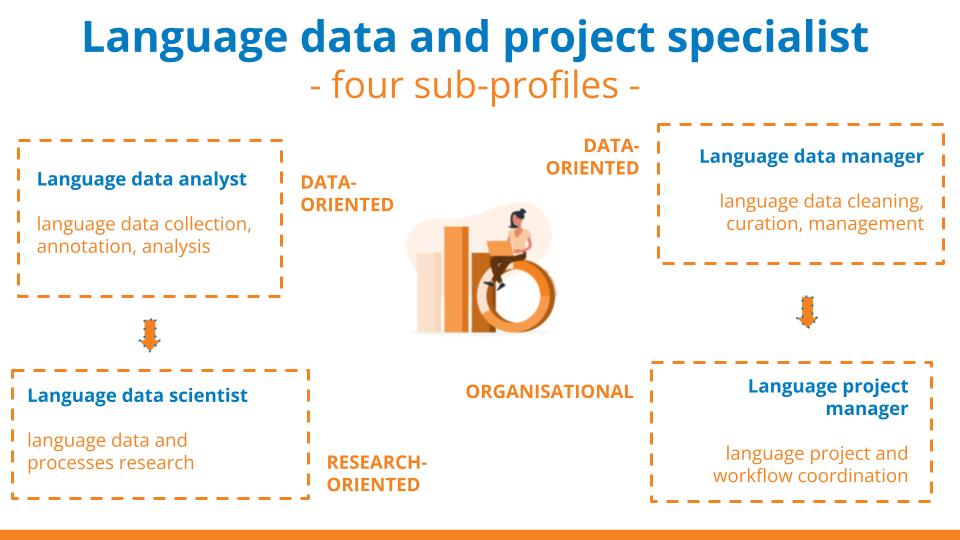
Figure 1. Linguists in tech profiles
The strength of the UPSKILLS needs analysis lies in its putting into words what many of us linguists in Academia already knew: language and linguistics students have a relatively restricted range of employment opportunities after graduation, often corresponding to editorial, translation or teaching jobs. But the needs analysis also shows a rich range of opportunities in tech which could become accessible to our students should the identified skill gap be addressed by the institutions. The analysis goes further and paves the way to this change by specifying the modules that curricula should integrate for these opportunities to materialize.
Panel discussion: what can we do?
Moderator Tanja Samardžić, University of Zurich UPSKILLS team; with Andrea Rocci, Samuel Läubli as invited speakers and Genoveva Puskas, Maja Miličević Petrović, Stavros Assimakopoulos and Jelena Gledić from the UPSKILLS consortium.
There are jobs, in the communication job market, for which linguists would be better qualified than the typical people who come from a faculty of communication. Linguists are better, generally speaking, at analytical thinking and at analytical jobs.
The next question that we faced is how to use the needs analysis to move forward. We tried to give it an answer in Lugano in the course of an interactive panel discussion between guests and members of the UPSKILLS consortium.
Prof. Andrea Rocci has an idea on how to proceed which is based on his own experience as Director of the Master program in European Studies in Investor Relations and Financial Communication (ESIR) offered jointly by his institution and the Università Cattolica (Milan). He thinks that a possible solution lies in the creation of interdisciplinary degrees, such as the one that he directs. Degrees of this kind allow language and linguistics students to enrich their background with skills that the companies wish to find in a candidate. As he says, the industry world is not interested in taking part in the design of courses that result in the creation of the type of candidates they sought to hire, but it is a world which is very open to hire candidates with a non-standard background. Companies suffer from the uniformity of thinking of their hires and candidates educated in the humanities who are also knowledgeable in a technical domain are the solution to this problem.
The same concept will come up again in Geneva in April 2023: companies want profiles that break the mold, but only as long as the burden of their formation will not fall upon them.
Thus, the convergence of interests shared by employers and universities requires the academic world to evolve and adapt to the job market at a pace which is unknown for most institutions and teachers. The UPSKILLS panelists agree on two short term solutions to speed up the change: at the teaching level, we need to discuss more the topic of students employability in order to eradicate certain taboos such as the necessity of teaching technical notions in the faculties of humanities; while at the institutional level, we should make a greater use of tools that already exist at the national level such as the Swiss Mobility program which allows students to take a modular, inter-university approach to their tertiary education.
Samuel Läubli tops it off by illustrating a paradox: in a world with a growing interest in topics like natural language processing and multilingualism, the number of language and linguistics students is declining. These academic fields need to renew their image and stop presenting themselves as costs to introduce the notion that language experts and linguists have a great potential to bring growth.
Samuel Läubli
Chief Technology Officer, Textshuttle
Tip for students:
Study plans are rigid, but many study plans have certain elements built into that give you a certain amount of flexibility. Knock at people’s doors and ask, and you will find something that is tailored to your needs, that responds to your interests.
Guidelines for integrating research and research infrastructures into teaching
Presentations by Tanja Samardžić and Iulianna van der Lek
As said above, teachers’ involvement is paramount to produce the shift that UPSKILLS intends to promote, and much of this discussion for us revolves around teaching practices and methods. Our preliminary surveys revealed that while the skills related to the execution of a research task are highly valuable for the industry world, instructors do not necessarily feel at ease with the idea of explicitly teaching them in a standard class setting. Despite their being part of our professional routine, as instructors we are not trained to teach soft skills, nor do we always have the time to illustrate the best way to execute tasks related to research. For this reason, one of the deliverables planned for the UPSKILLS project is the creation of guidelines to instruct teachers on how to design courses which integrate research activities and research infrastructures such as the ones maintained by the UPSKILLS partner CLARIN.
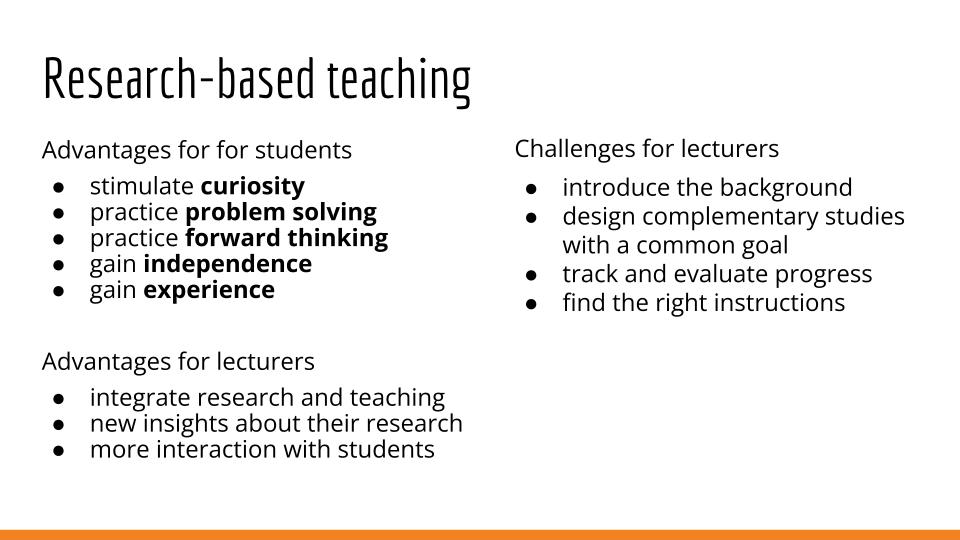
Figure 2. Advantages and challenges of research-based teaching
The guidelines presented at the event will soon be released in their final form and benefitted greatly from the comments of our guests in Lugano which we thank: Martin Hilpert, Simone Ueberwasser, Sandrine Zufferey and Didier Maillat.
The interest of integrating research and research infrastructures into teaching goes beyond the interest in teaching students what researching an academic subject amounts to. It rather has to do with the multiple abilities and skills that must be deployed to successfully complete a project of that kind.
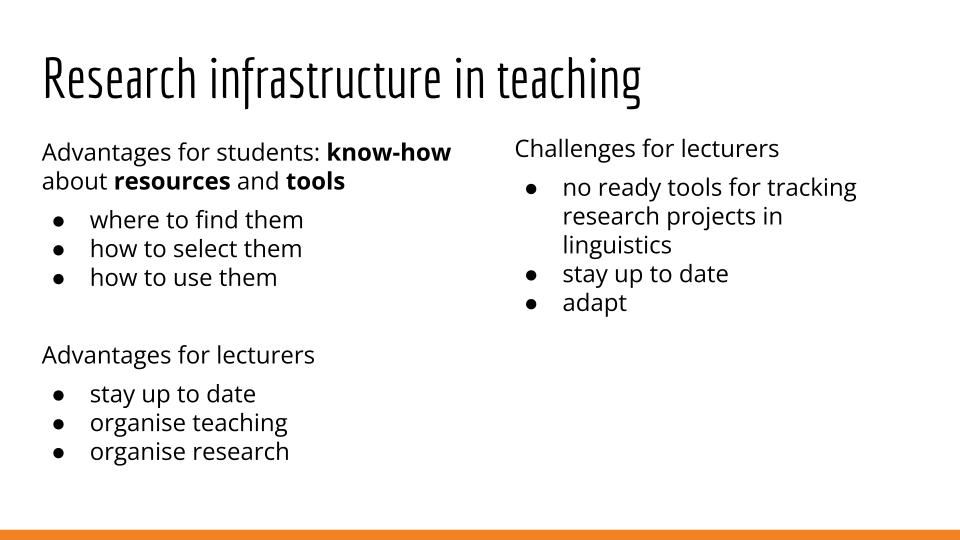
Figure 3. Advantages and challenges of integrating research infrastructures into teaching
Learning about research means to stimulate curiosity, practice problem solving, and gain experience and independence. As pointed out by Simone Ueberwasser of the Zurich Center for Linguistics, even writing a paper is a project to run, while she stressed the importance of raising awareness among students about the complexity of the tasks that they are asked to perform. Learning a skill means to own it by being able to name it formally as much as it is about being able to use it practically.
Simone Ueberwasser
Project Coordinator “Whats app Switzerland”, University of Zurich
In addition to this, she stressed how research-based teaching benefits not only students, but also teachers for whom a hypothetical paper stemming from a class of this kind amounts to part of their academic output for the year. Teaching and researching, therefore, is desirable for all parties and should be encouraged.
However, other members of our panel raised interesting objections about the concrete usability of the guidelines in their initial version. The general sentiment among our guests was that it would be difficult to implement a course based on them, their main problem being a “lack of granularity” to be intended in several senses. As Prof. Hilpert put it, the guidelines must be more attractive, by slimming them, and making them easily accessible. Another element of criticism pertained to their lack of balance between the generality of the actual guide, and the extreme specificity of the examples proposed as supporting material. Prof. Maillat underlined the risk of a “one size fits all” approach, in producing guidelines intended for anyone but that strongly rely on competences that are not taught to all students of languages, and Prof. Zufferey added that many departments might not be interested in providing the needed level of expertise in a generalized way making the guidelines of limited interest. This feedback has been integrated by the developing team, as it can be seen in later on in this blog entry.
Time to play: Guess the Language!©
The last session of the meeting was devoted to a discussion about the learning material produced by UPSKILLS. Most of our material was in its conception phase at the time, including the language game “Guess the language!” designed by the Unige team for which we were able to present a prototype.
The idea behind the game is that children learn languages effortlessly and they can learn more than one at the same time, as illustrated by the fact that in many societies bilingualism or multilingualism is pervasive. People do not seem to have trouble with juggling two or more codes in their daily life. But what do they learn when they learn a language? In other words: what is a language?
This question lays at the very heart of all branches of linguistics, including computational linguistics. The game presented by Margherita Pallottino and Genoveva Puskas of the University of Geneva is based on the idea that languages are collections of permanent and transient features which are non-language specific. Whereas the uniqueness of any language depends on the combinations of possible features that they realize.
By playing Guess the language! © the user will learn how to compare different linguistic codes by decomposing them into features.
But the question is: is it too playful for Academia? And this is what our colleagues in Bern and Fribourg thought of it:
Prof. Sandrine Zufferey on Guess the language! ©
Prof. Didier Maillat on Guess the language! ©
If they convinced you, just download Guess the Language! and use it in class!
Linguists in Tech, closing the skills gap
The second Swiss Multiplier event: Geneva 21st and 22nd of April 2023.
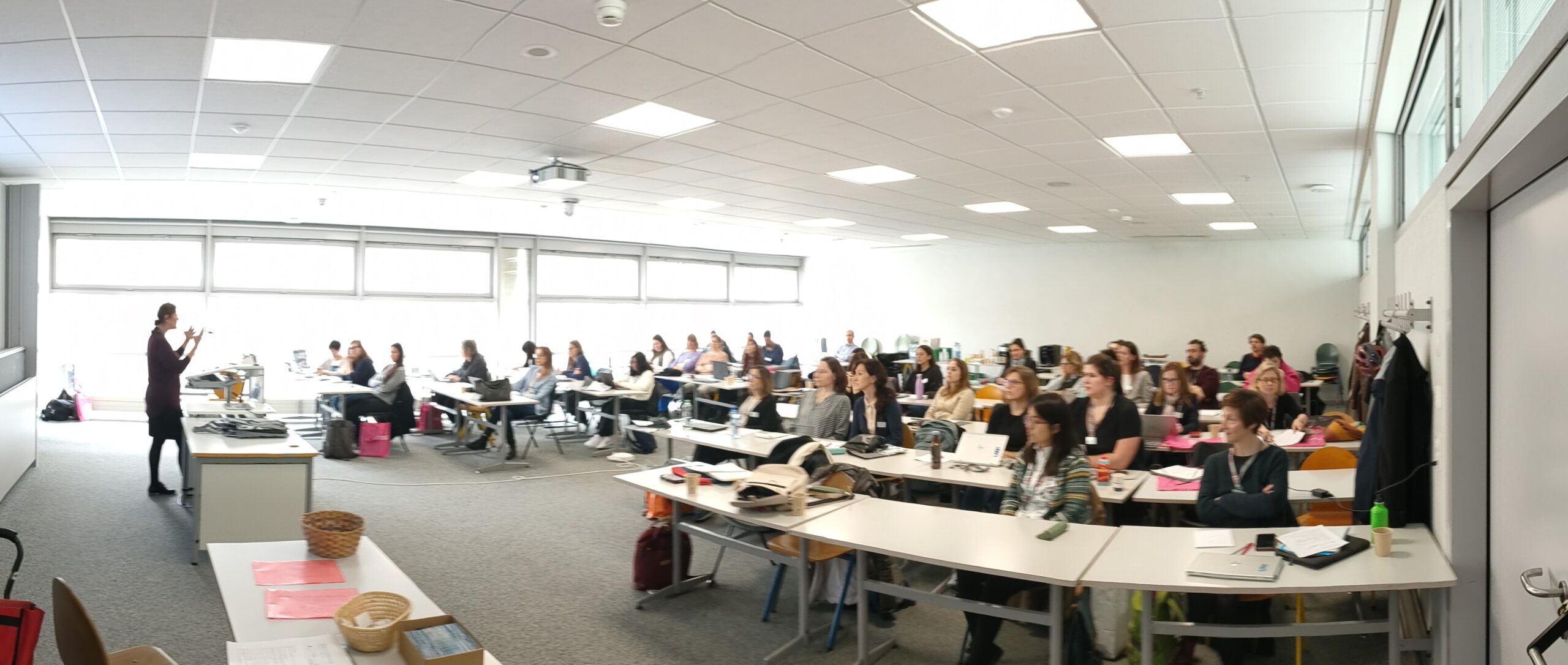
The second Swiss Multiplier event was held in Geneva in April 2023. The event was co-hosted by the University of Geneva, the University of Zurich and the recently born CLARIN-CH. The event was designed for an audience of two kinds: academic instructors who could be interested in adopting our learning materials, and linguists and language specialists who want to upskill their profile to land a job in tech. These two parallel themes interwove in the course of the two-day spring event, and in this blogpost, you will find the summaries of the various discussions under the sections “tools for teachers and learners”, and “testimonials”.
Tools for teachers and learners
CLARIN-CH and CLARIN-ERIC
Presentations by Cristina Grisot & Iulianna Van der Lek
CLARIN-CH is a new reality for Swiss linguists, although CLARIN is not. CLARIN is a digital infrastructure which offers support to researchers interested in studying linguistic data by helping them manage their data and by providing tools and support. CLARIN is a partner of the UPSKILLS consortium given the affinity of their mission and that of the project.
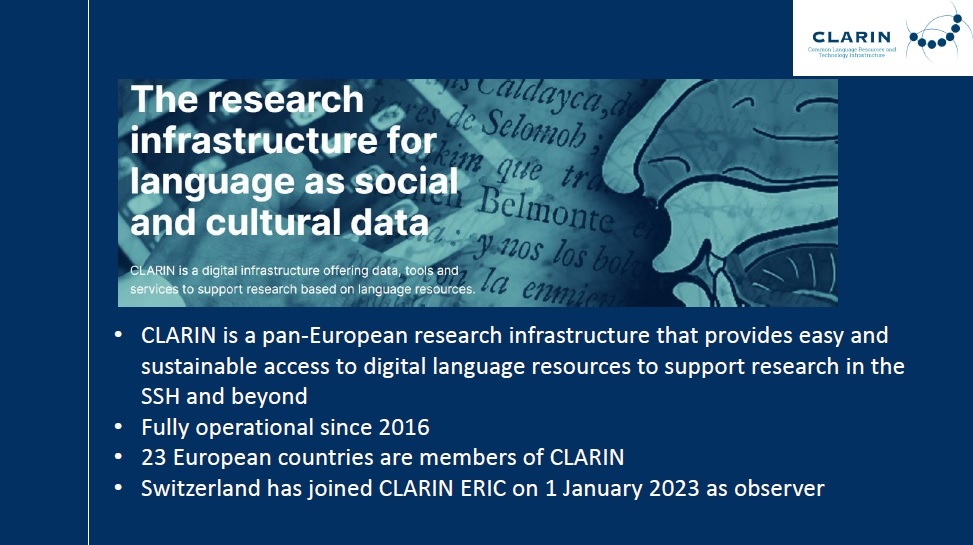
Figure 4. Introduction to CLARIN
In the course of the Geneva event, we had the opportunity to hear from Cristina Grisot, the Swiss National Coordinator for CLARIN-CH, a presentation about this new branch and its role with respect to the overall CLARIN network. Since the 1st of January of 2023, Switzerland has joined the network as an “observer”, as such the mission of CLARIN-CH is to build an active and impactful national network with the primary objective of obtaining Switzerland’s full membership. To know more about what CLARIN is and its Swiss branch, download Cristina Grisot’s presentation. Alternatively, if you want to get your hands dirty with some activities and know more about how CLARIN works, you can go to the UPSKILLS learning block designed by Iulianna Van der Lek and Darja Fišer.
The learning content block is titled: “Introduction to Language Data: Standards and Repositories“and its aim is to introduce teachers and students to research data repositories and their role in the linguistic research data lifecycle in the context of Open Science and FAIR data principles. A presentation of the block can be downloaded at the end of the blog, and the block is already on Moodle, from where presentations, examples and learning activities are available to pick and choose.
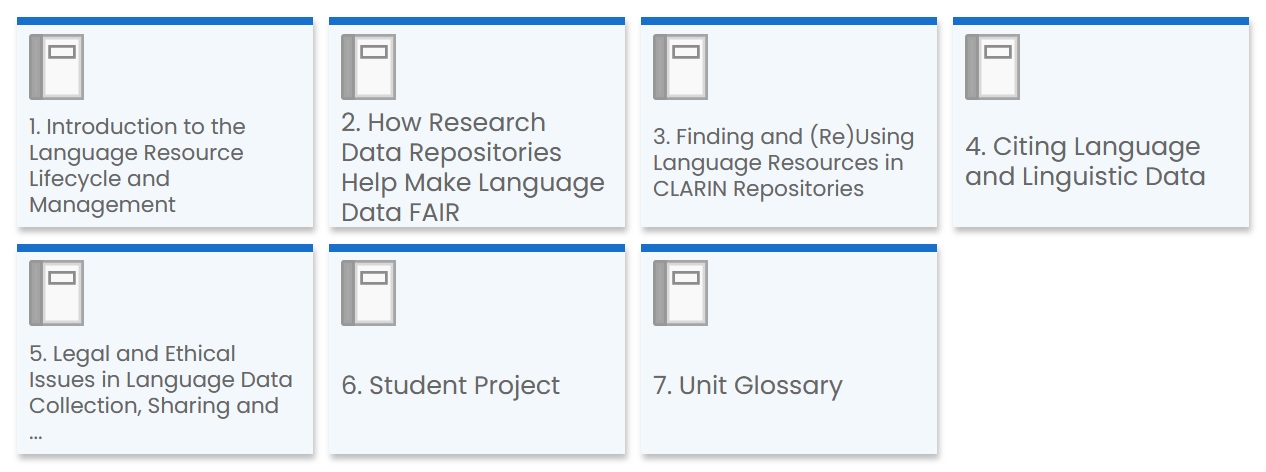
Figure 5. Structure of the “Introduction to Language Data: Standards and Repositories” learning block
Serious games and the DSI Community Gaming at the University of Zurich
Presentations by Hiloko Kato & Leyla Feiner
Leyla Surya Feiner
- Manager of the DSI Gaming Community
- E-Learning producer at UZH, Faculty of Arts and Social Sciences
- BA in History, Comparative Literature, Human-Computer Interaction
- Hobby game developer
The DSI community “Gaming” of the University of Zurich started out as part of the UPSKILLS project and now has a life on its own. The mission of the community is to bring together researchers who work ON and WITH digital games. The chair, Dr. Hiloko Kato, gave a presentation in Geneva about the community’s past activities and future projects. Whereas the community manager, Leyla Feiner, presented a series of tools that can be used to create customized digital games with little technical expertise. Go to the “download presentations” section at the bottom of this blog entry to learn more about these tools.
Hiloko Kato
- Postdoc SNSF Sinergia Project Confoederatio Ludens
- Research Associate GameLab at the ZHdK
- Lecturer at the ZHdK Game Design department
- Chair of DSI Community Gaming
The UPSKILLS learning material
What we understood in these two years of UPSKILLS is that much ready-made learning material can be found on the internet for the ones who aim at getting a job in tech. The advantage of UPSKILLS is that we skimmed these materials for you in order to produce learning contents which are specifically adapted to the needs of language and linguistics specialists. Four UPSKILLS learning blocks were presented by their creators in the course of the Geneva event.
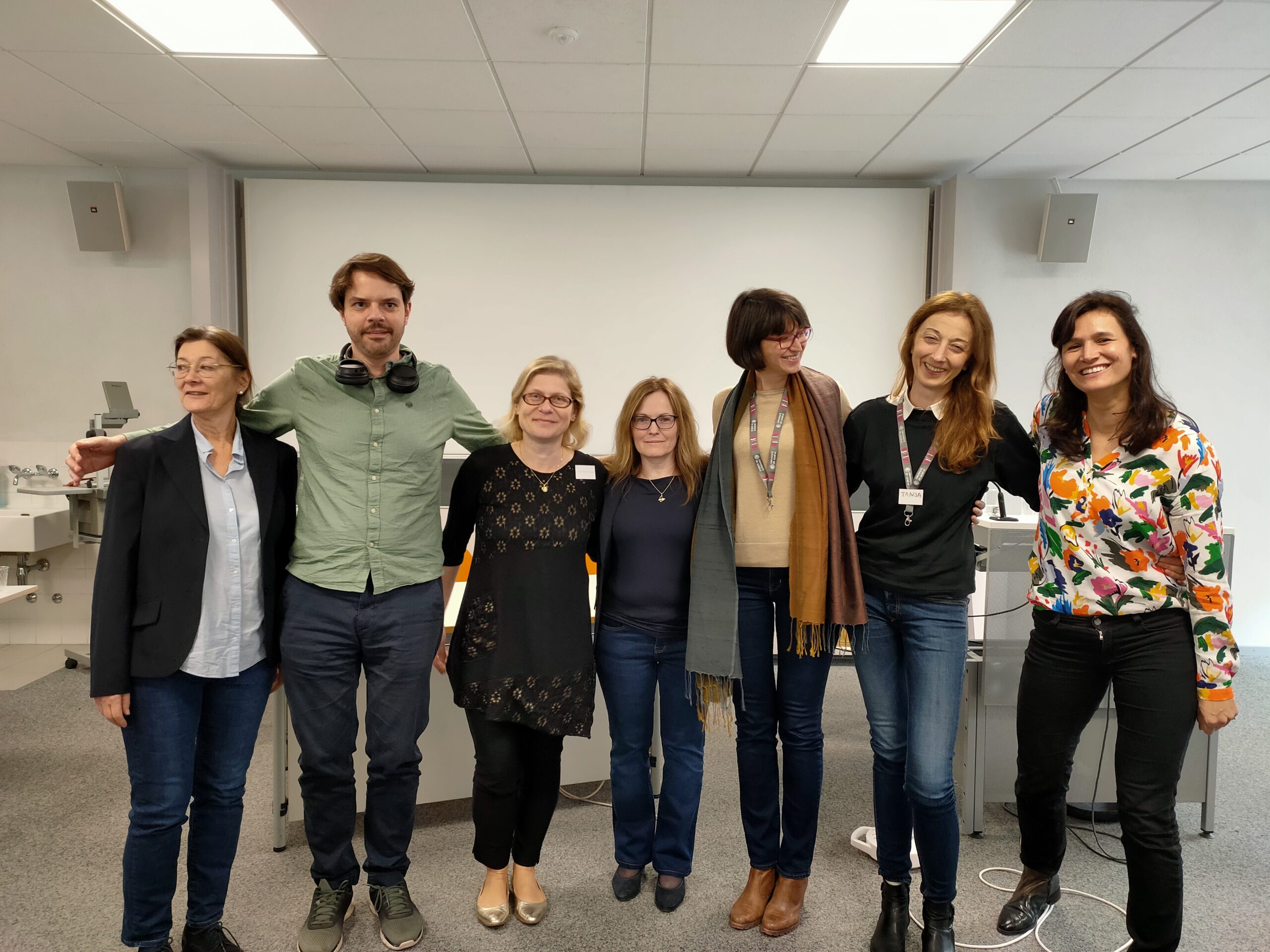
UPSKILLS content creators in Geneva, from left to right: Genoveva Puskas, Marko Simonović, Tihana Kraš, Iulianna Van de Lek, Margherita Pallottino, Tanja Samardžić, Lonneke Van der Plas.
- Collecting language data from human participants
- Upskilling your “Introduction to Language variation” course
- Start programming with Python in 10 steps
- The essence of machine learning for linguists in tech
Designed by: Boban Arsijenević, Tihana Kraš, Marko Somonović, Martina Podboj, Jelena Živojinović
This learning block is focused on collecting language data from human participants and is structured into four modules. The first module, called GENERAL, focuses on methods for collecting language data from human participants, as well as ethical considerations and population sampling in linguistic research. In the second module, referred to as WORD-LEVEL PHENOMENA, students learn to design judgment and elicited production tasks targeting morphophonological or morphosyntactic phenomena. The third module, named SECOND LANGUAGE ACQUISITION, covers designing experimental tasks to test comprehension and production in the second language and to elicit acceptability judgments about the second language. The fourth module, called SOCIOLINGUISTICS, deals with planning and conducting ethnographic fieldwork in sociolinguistics, as well as with data collection through the sociolinguistic interview, and through surveys and questionnaires in sociolinguistics.
Designed by: Genoveva Puskas, Margherita Pallottino & Marie Berthouzoz
The material presented in this block amounts to a full introduction to language typology/language variation course for teachers who are willing to experiment with a game-based approach to the subject. The modular structure of the block is meant to allow an instructor to gauge the workload on that fixed by the curriculum of their institution, but also to allow them to pick single units to be inserted in the courses that they designed.
After the completion of the entire block, students will be familiar with the concept of language variation and some basic principles of Generative Grammar. In addition to this they will learn to collect linguistic data, organize and annotate the data, confront the data with a theory, interact minimally with programming and elaborate a report of the research activities.
Designed by: Tanja Samardžić, Marc Tanti, Lonneke Van der Plas, Leo Ting Pan & Marie Berthouzoz
This is a guide on how to start programming with Python if you are a student of language or linguistics considering a career in technology and science. Here are your 10 steps for a workload equivalent to 5 ECTS:
Step 1: Enter the world of programming
Step 2: Watch Python code demo
Step 3: Write and run your first programs
Step 4: Figure out some details
Step 5: Get out of your notebooks
Step 6: Start matching with regular expressions
Step 7: Grow your dictionaries
Step 8: Web is the limit
Step 9: Organise your code with functions and classes
Step 10: Contribute your code
Explore this learning block on our Moodle platform
Designed by: Tanja Samardžić, Marc Tanti, Lonneke Van der Plas & Marie Berthouzoz
This is a guide on how to acquire the core set of notions in machine learning that are necessary for students of language or linguists who plan to work with engineers and scientists. Learning about the 10 following topics requires the amount of work corresponding to 5 ECTS:
Step 1: Machine learning needs linguists
Step 2: Things in mathematical space
Step 3: Data points need labels
Step 4: Setting boundaries with the perceptron algorithm
Step 5: Linguists need neural networks
Step 6: Meanings are vectors
Step 7: Learning meanings with (large) language model
Step 8: NLP tasks for happy users
Step 9: How good is an NLP model?
Step 10: The practice and ethics of large language models (LLMs)
Explore this learning block on our Moodle platform
To see all the UPSKILLS learning blocks go to our MOODLE platform and create an account.
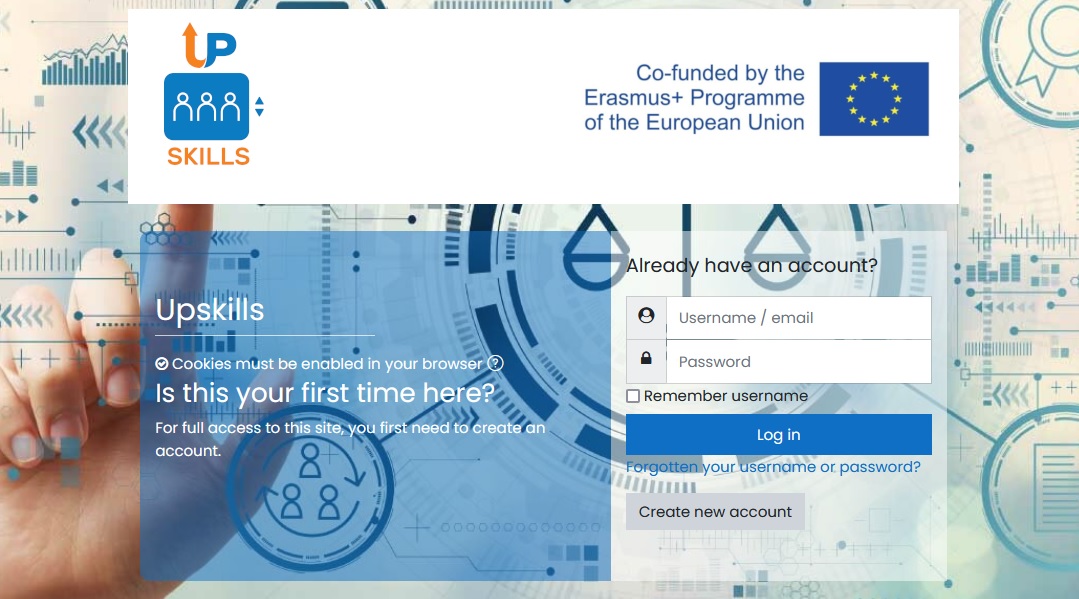
Figure 6. Homepage of the UPSKILLS MOODLE platform. Click the “Create new account” button to get started!
Testimonials
The second theme of the Geneva event was to get our audience to exchange with people who come from a linguistic background and are currently working in tech. This part of the event was organized with the help of Caterina Bonan, theoretical linguist & UNIGE alumni, who now works as Services Data Scientist at Five9. Thanks to Caterina’s scouting ability we were able to have with us great guests and listen to inspirational talks, starting with her own.
Talk “Breaking into industry with a non-STEM degree”
Presentation by Caterina Bonan
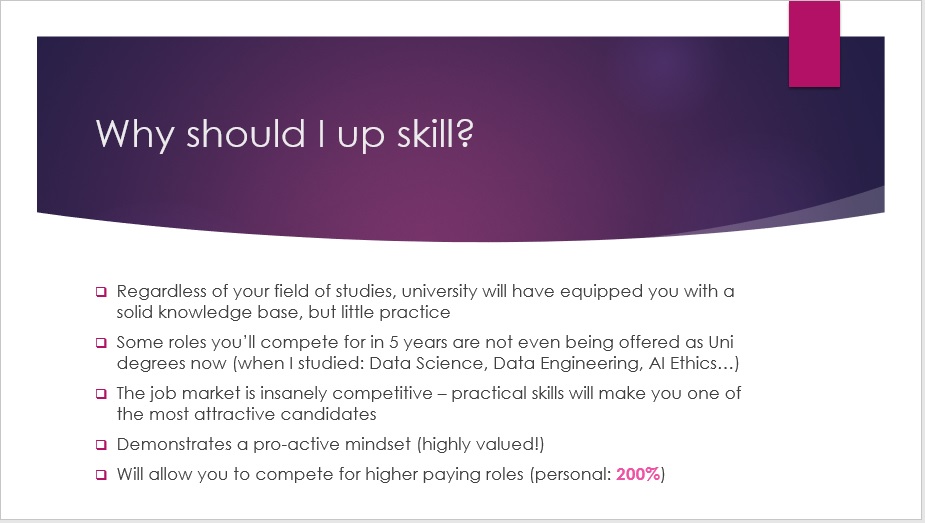
Figure 7. Why to upskill!
Two main points emerged from Caterina’s talk: a transition from being a language and linguistic expert to being a language expert in tech is possible, and indeed it’s a smart move! It’s also a relatively time-consuming process and, although it is never too late to consider a career change, the sooner one starts one’s own upskilling journey, ideally during your studies, the easier it is. In all cases reward is grated to those who get to the end of their atypical formation.
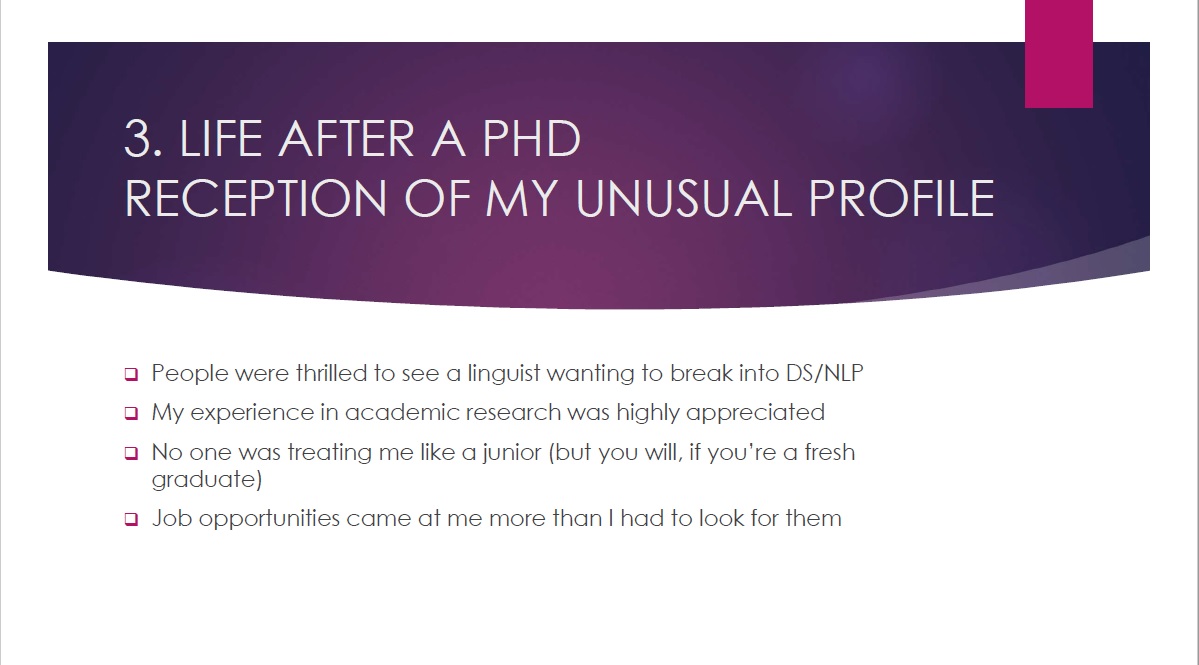
Figure 8. Linguists in tech
Talk “From theoretical linguistics to ML engineering”
Presentation by Aleksandra Vercauteren
Two main points emerged from Caterina’s talk: a transition from being a language and linguistic expert to being a language expert in tech is possible, and indeed it’s a smart move! It’s also a relatively time-consuming process and, although it is never too late to consider a career change, the sooner one starts one’s own upskilling journey, ideally during your studies, the easier it is. In all cases reward is grated to those who get to the end of their atypical formation.
The second talk of the theme was given by Aleksandra Vercauteren; Aleksandra is the head of NLP at Metamaze and told us about her journey to get where she is now, which by the way was a really speedy one. Aleksandra finished her PhD in theoretical linguistics and decided to reshape her career. She attended a 16-week bootcamp in the USA, at the time there were none in Europe, and that plus some hands-on project work she carried out in the meantime allowed her to land her first job in NLP soon after. We thank Aleksandra not just for her enthusiastic participation in our event, but also for the insightful post she posted about it on LinkedIn.
Her take-home message in a nutshell is the following:
1. BA and MA linguistics students must learn research skills and interiorize scientific methods
Lots of linguists do not know their worth in the job market.
2. Linguists must be able to explicitly present the skills they acquire, especially the ones that are highly valuable on the job market.
3. Opportunities are available to linguistics students, but they often lack knowledge of the job market. Universities could help solving this problem by creating more exchange opportunities between potential employers and candidates.
4. Hybrid profiles like hers are in demand.
Visit the link to read the entire post!
Panel discussion: what does it take to work in tech today?
Moderator: Caterina Bonan, with: Effi Georgala, Manager II NLP Research at Nuance Communications; Janine Aeberhard, Linguistic Director at TextShuttle; Lonneke Van der Plas, Group Leader at IDIAP, Associate Professor at UM.
And to conclude our event, a poweful group of women in tech told us about their experience in the industry world. In synthesis what came out from the discussion was this:
- Companies hardly invest in training their new employees, but rather they recruit people who already have the skillset that is needed for the job. If a candidate wishes to maximize their chances to get their dream job in tech, they must prepare for it by acquiring technical skills before applying. Once this happens, doors open.
- Occasional recruiting of someone who is still upskilling is possible, but keeping the job requires the ability to learn fast, to integrate rapidly the knowledge needed on the job and to do it in an independent and proactive fashion.
- Upskilling as a complementary operation, on top of academic studies or of a full-time job for instance, can be daunting and extremely challenging for many. Thus, ideally, introducing already in the earliest years of the academic formation the basics of programming, NLP, statistics, etc., would allow a larger number of candidates from the humanities to access jobs in tech.
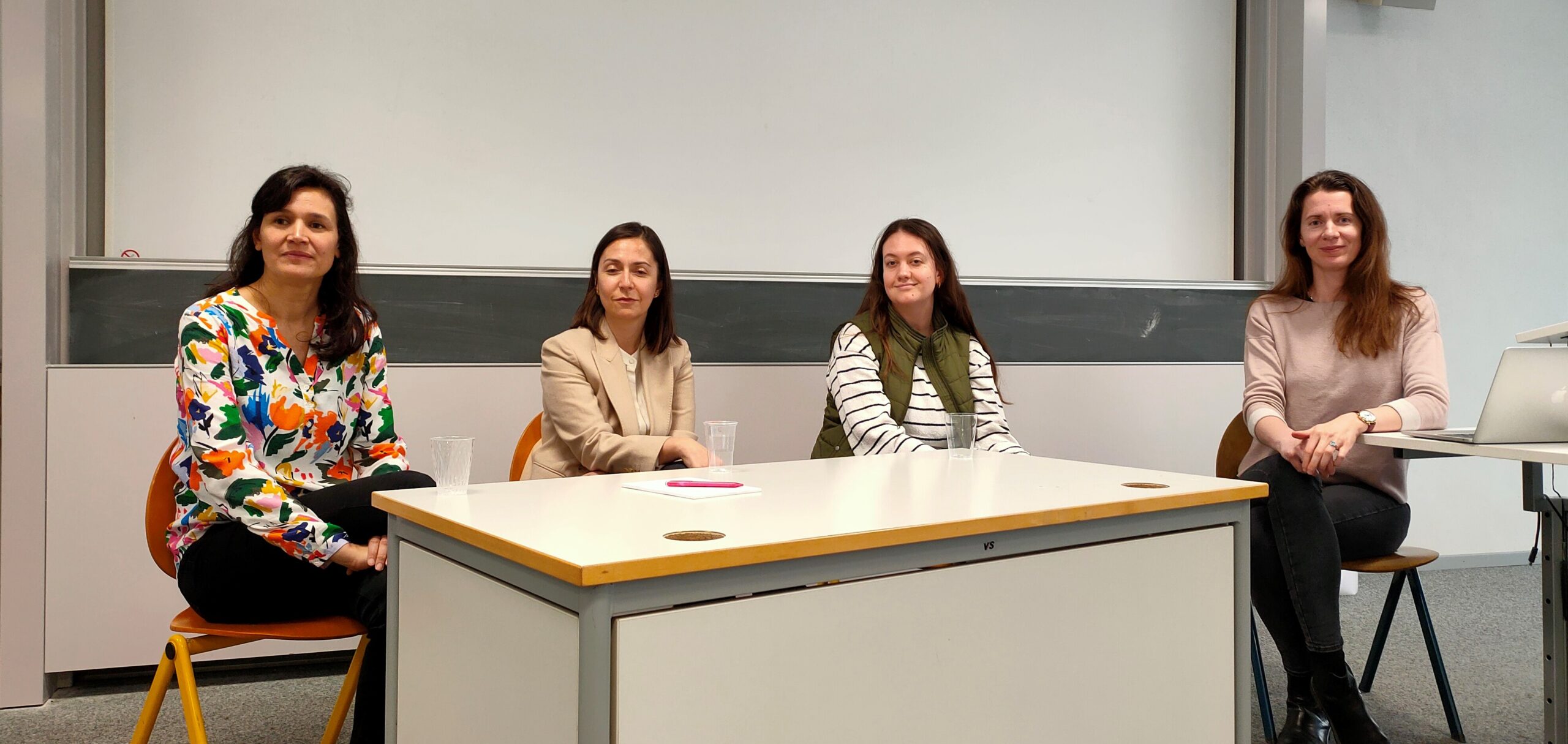
From left to right: Lonneke Van der Plas, Effi Georgala, Janine Aeberhard and Caterina Bonan
At finish line: July 2023
With two months to go to the conclusion of the project, here’s a list of what we are working on:
The UPSKILLS Summer School in Petnica (RS), Organizer: Jelena Gledić, University of Belgrade.
A research tool to help students track their progress when running a project, created by Tanja Samardžić and Marie Berthouzoz, UZH (coming soon).
A tool to explore emerging language career opportunities, created by the UNIBO UPSKILLS team (coming soon).
A browsable version of the Research Based Teaching guidelines, created by the University of Graz UPSKILLS team (coming soon).
Download the presentations here:
- “What is UPSKILLS? Welcome to the Second Swiss Multiplier Event”, presenter: Genoveva Puskas.
- “The UPSKILLS needs analysis”, presenters: T. Samardžić, S. Assimakopoulos, M. Miličević Petrović & J. Gledić
- “CLARIN & UPSKILLS”, presenter: Iulianna Van der Lek
- “CLARIN AND ITS SWISS NODE CLARIN CH: SUPPORTING RESEARCH”, presenter: Cristina Grisot
- “Breaking into industry with a non-STEM degree”, presenter: Caterina Bonan
- “A short presentation of the DSI Community Gaming”, presenter: Hiloko Kato
- “A brief overview of useful game development tools”, presenter: Leyla Feiner
- “Collecting data from human participants”, presenters: Tihana Kraš & Marko Simonović
- “Upskilling your Introduction to Language variation course”, presenter: Margherita Pallottino
- “The essence of machine learning for linguists in tech”, presenter: Marie Berthouzoz
- “Start programming with Python in 10 steps”, presenter: Marie Berthouzoz
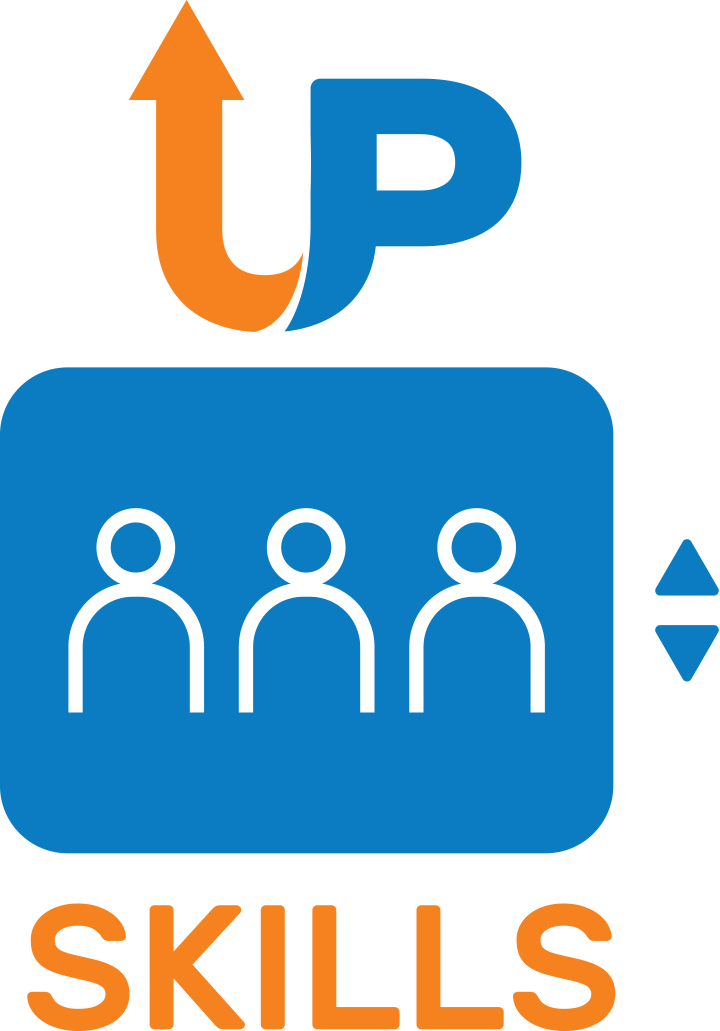
Recent Comments